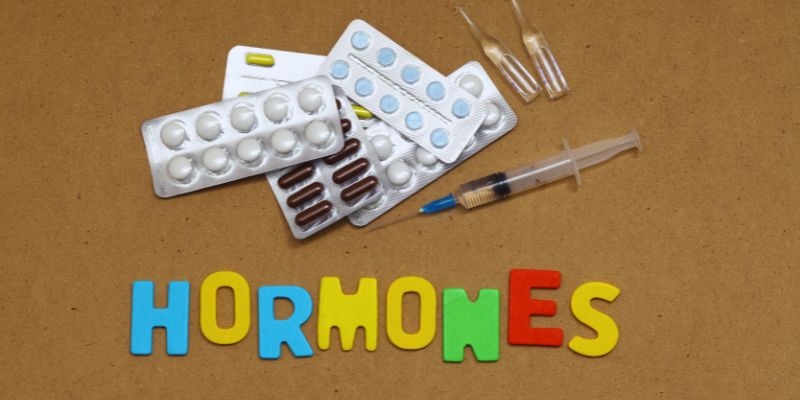Does Hormone Therapy Pose a Cardiac Risk: Everything You Need to Know
Therapy is often recommended for various diseases. It regulates low hormone levels, certain cancers, menopause symptoms, and other disorders. Many individuals worry about how it affects heart health. Does hormonal therapy increase the chance of cardiac death? Studies show it might not be as harmful as previously believed. Some studies even imply possible heart benefits in some situations. This research explores the link between hormone therapy and heart problems.
It addresses its repercussions, risks, and vital aspects of philosophy. Understanding this strategy can help you make informed medical decisions. If you are considering hormone treatment, you must learn about the various risks. Moreover, it ensures safe treatment through regular visits and suitable medical advice. Let's look at how hormone treatment links to heart disease to address common questions.

What is Hormone Therapy?
Hormone treatment substitutes for or supplements natural hormones to correct body imbalances. It is frequently recommended for treating menopause symptoms, including mood swings, hot flashes, and sleep difficulties. Doctors may also advise it for thyroid problems, or hormone-sensitive tumors like breast malignancies. Targeting hormone-dependent growth helps some cancers in cancer treatment delay or stop their spread. Hormones affect fundamental physiological processes like metabolism, mood, bone strength, and cardiovascular activity.
This wide influence has spurred debates on whether hormone treatment raises hazards, especially with other disorders and heart health. Although it has many advantages, including better quality of life and symptom relief, potential hazards vary depending on age, medical history, and treatment. One must first know the goals, advantages, and negative effects of hormone treatment. It helps people make wise decisions in line with their doctors, balancing benefits with any hazards.
How Heart and Hormones Are Linked?
Maintaining cardiovascular health requires hormones. Estrogen, in particular, helps control blood vessel activity and lower inflammation, which is vital for heart function. Estrogen levels drop at menopause, thereby raising the risk of heart disease. Restoring estrogen levels with hormone treatment might provide cardiac protection. Earlier research, however, sparked questions about the possible hazards of hormone treatment, especially concerning a higher risk of heart attacks.
These studies showed that hormone treatment might not be helpful for everyone, particularly for older women. More recently, studies reveal a more complex picture whereby the effects of hormone treatment on cardiovascular health are mostly determined by time, dosage, and personal health variables. Beginning hormone treatment early in menopause, for example, might help the heart remain healthy. Starting therapy later, on the other hand, may pose more hazards. Examining the possible advantages of hormone treatment for heart health requires careful attention to these elements.
Does Hormone Therapy Increase Cardiac Death Risk?
According to recent studies, hormone treatment does not noticeably raise the risk of cardiac mortality. Specific results show that heart-related risks might even be lower for specific people. The Women's Health Initiative (WHI) study first sparked questions over the hazards of hormone treatment for older women. Later studies revealed that the time of therapy and age were closely correlated with the hazards. Those who began hormone treatment ten years after menopause reported fewer heart-related problems than those who started later.
Reassuring patients and clinicians about its safety, a 2022 study revealed no higher risk of cardiac death among those on hormone therapy. Despite these encouraging findings, it is crucial to remember that individual variables significantly affect results, including age, medical history, and the kind of hormone treatment applied. In the end, these elements affect the effect of hormone treatment on heart health, thereby stressing the need for individualized healthcare decisions.

Factors Influencing Hormone Therapy and Heart Health
Many elements influence the effect of hormone treatment on cardiac conditions. Age, treatment timing, and general health make key contributions.
- Age and Menopause Timing: Women starting hormone treatment early, during menopause, may have better heart health. Starting hormone treatment later in life, meanwhile, could raise heart disease risk.
- Type of Hormone Therapy: Generally speaking, estrogen-only treatment is seen to be less risky than combination estrogen-progestin treatment. Women who have had a hysterectomy especially should consider this difference as they might not need progestin.
- Lifestyle Choices: Heart-related risks can be greatly raised by factors including smoking, a poor diet, and little exercise. Changing to a better lifestyle will help the advantages of hormone treatment be more pronounced.
- Genetic Factors: Furthermore, genes influence cardiovascular health and hormone treatment. Using hormone treatment may cause certain women to be genetically inclined to increase heart risks.
Who Should Avoid Hormone Therapy?
Not everyone will benefit from hormone treatment, particularly those with some medical issues. Generally speaking, those who have a history of heart attack, stroke, or blood clots should avoid hormone treatment since it can raise their chance of these events. Hormone treatment is also discouraged in patients with some malignancies, especially hormone-sensitive tumors like breast or uterine cancer. Furthermore, people with severe liver illness could experience side effects from hormone treatment since the liver is essential in hormone metabolism.
Under these circumstances, doctors frequently advise non-hormonal substitutes to control symptoms. These could be adjustments in lifestyle, including nutrition and exercise, a medication that does not involve hormones or alternative therapy. You must carefully review your health background with your doctor to find the best and most efficient therapy choices. Your healthcare professional can help determine the best course of action for your circumstances by weighing personal risks.
Conclusion:
In some circumstances, hormone treatment may improve heart health; it does not raise the risk of cardiac mortality. Medical history, timing, and age all affect its effects. Early in menopause, women who begin medication could find cardiovascular protection. It also contains certain possible hazards, including a higher likelihood of blood clots, stroke, or breast cancer in some persons. Safe use depends critically on regular medical advice and wise decision-making. Those unable to use hormone therapy or alternative treatments should take non-hormonal medication or lifestyle modifications under consideration. See your doctor always for the best course of action.











